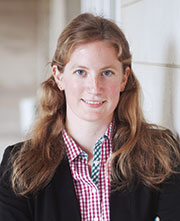The Economics Professor
Fall
2022
Spotlight on Hidden Physicists
The Economics Professor
Hannah Gabriel, Assistant Professor of Economics, California State University, Sacramento
 I was cruising along as a physics major in college, thinking I’d eventually get a PhD in physics, when I decided to add an economics minor. Then I started really liking my economics classes. A lot. I remember thinking, This is something that I’m very good at and that comes very naturally to me. What do I do now?
I was cruising along as a physics major in college, thinking I’d eventually get a PhD in physics, when I decided to add an economics minor. Then I started really liking my economics classes. A lot. I remember thinking, This is something that I’m very good at and that comes very naturally to me. What do I do now?
Physics and economics have a lot in common. Both use rigorous mathematics to study real-world problems, and both use logic and model building to explain complex phenomena. Both explore broad, abstract concepts.
Ultimately, I decided to pursue a PhD in economics, in part because I liked the social science aspect of studying human behavior. I’m not the only one to travel this path. Other physicists have transitioned to economics (although it’s much less common to go in the other direction!). In economics, someone with a physics background is recognized for being familiar with rigorous mathematics and thinking broadly about the world.
I took a gap year before graduate school to take some additional math and economics classes and then started working toward my PhD. The first year of economics grad programs focuses on foundational math. It’s far removed from typical economics research and extremely challenging, but I was just as well prepared as everyone else. One of the fun, unique things about economics is that you don’t necessarily need a bachelor’s degree in economics to get a PhD, but you need to have a strong
math background.
I’m an applied economist specializing in international economics and how economies change. I look at globalization: the rise of multinational firms, the differences between multinational firms and domestic firms, and multinational banks and international banking. For example, I have a paper that examines how an international bank becoming a domestic bank impacts the firms that are borrowing money from that bank.1
The paper focuses on a banking turnover that happened in Hungary and examines how that event affected Hungarian firms. Economists call this a natural experiment―an event that is not controlled by researchers but can still be studied academically. Natural experiments are different from experiments in the physical sciences, where researchers often carefully control the setup and execution. I can’t control who’s buying and selling banks in Central Europe, but I can follow along with current events and say, “I have historical data that might reveal the downstream effects of this.” We can abstract from our studies of specific events to provide policy recommendations, cautionary tales, or other takeaways for today’s decision-makers.
Applied economists don’t usually collect their own data. Some conduct surveys, but good survey design is its own skill. We primarily use public data sets or anonymized administrative data from banks, firms, states, countries, or other entities. We might partner with an entity or reach out in hopes that one is interested in being studied and will send us its data. Finding data is half the battle in economics. If there’s something you want to study, you can only move forward if the data exist and the data steward is willing to share them with you.
I became an economics professor in fall 2020, so my first semester of teaching was completely online and in the middle of the pandemic. Teaching classes has a steep learning curve, but I’ve found that it gets easier with time. The experience is rewarding, especially when you see students grasp a complicated subject. I love hearing from students who have taken one of my classes about what they’re up to now and the cool internship opportunities or job interviews they’ve had.
While I conduct research year-round, I do a lot of research during the summer or during January term, when I’m not teaching. I love the flexibility and freedom to study whatever problems I’m interested in from anywhere. Unless we have a large data set that needs high-powered computing, economists can work anywhere with a Wi-Fi connection. Most of us don’t need labs and, for the most part, are less reliant on grant funding than physics researchers.
To the physics students out there, my advice is to stick with the degree. A bachelor’s degree in physics is one of the most versatile degrees out there. It signals that you’re a smart and quantitative problem solver, which is useful in any job. If you don’t want to be a traditional physics professor, you can cast a very wide net in your job search. You’re more qualified than you think you are.
If you like physics research but are interested in studying the human aspects of current events, consider going into economics or other social sciences. It’s not all about finance. You can study the economics of education, labor, industrial organization, and so much more. It’s a very engaging discipline.
I was inducted into Sigma Pi Sigma as a physics major at Lawrence University. I learned last week that you still get to call yourself a physicist even if you pivot careers. It’s nice to have reassurance that being a physicist never goes away.
References
1. “Multinational Activity and Banking: The Effects of Ownership Status on Exporters” is available at sites.google.com/a/msu.edu/hannahcgabriel/research.
